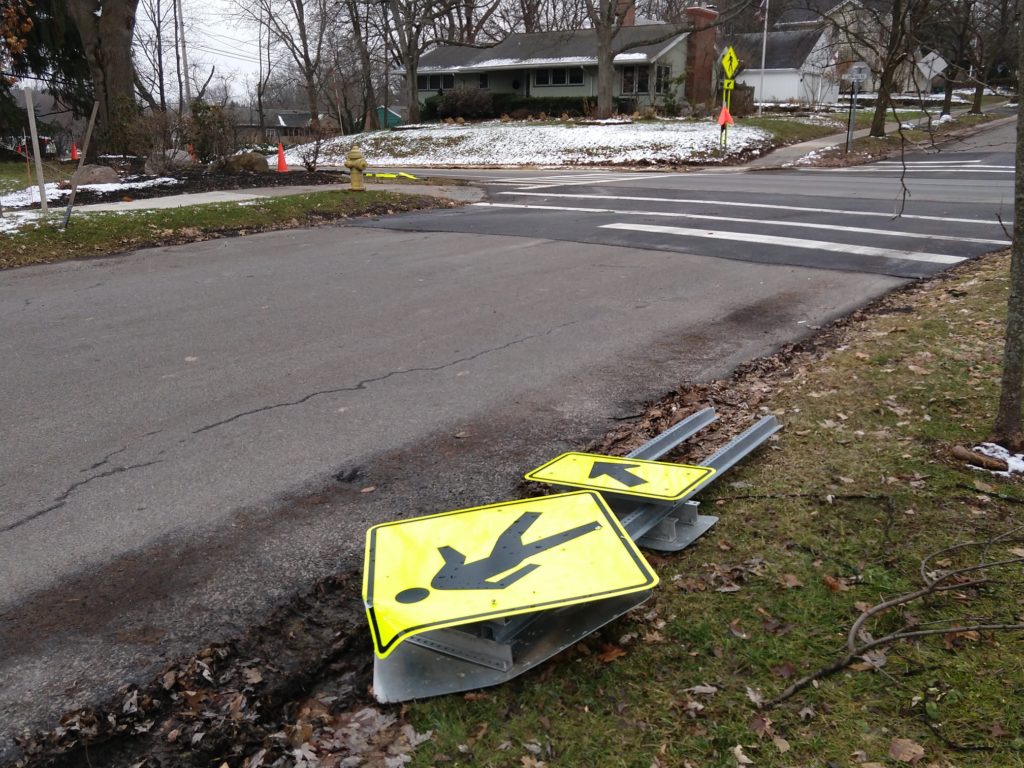
My son asked a simple question last night that turned into a larger discussion about the culture of driving.
He asked why drivers rarely stop when he waits at the crosswalk near our house. We live in one of the most walkable neighborhoods in the area, with several clearly marked mid-block zebra striped crossings that he has to traverse to get anywhere. They all are adjacent to bus stops and even have a “State Law, Stop for Pedestrians” yield sign in the middle. And drivers still don’t stop.
I told him I think most people aren’t ignoring pedestrians on purpose or because they are meanies, but because they don’t know they are supposed to stop for pedestrians. My husband feels quite differently. He jumped in: “But it’s on the sign. They know they are supposed to stop. They just choose not to.”
I have long claimed that what our community needs to make drivers more aware of pedestrians is a public education campaign. My premise is that most people don’t know they are supposed to yield to pedestrians in crosswalks, so we need to educate them. My husband thinks drivers know better but choose not to, because we are in a different state of mind when we are driving.
And that brings me to my question…
Can you be a courteous driver if all you ever do is drive?
Will simply having experienced what it is like first-hand to try to cross that street on foot, ride in a bike lane or walk your child along a busy street make you more conscientious when you are behind the wheel?
Or is it human nature to be a bit self-centered when you are cocooned in your car alone, regardless of your other activities?
For example, I have been a runner all my life and I think that gave me perspective on what it’s like to be on the streets and out of a car. I have run on all sorts of crazy streets in all traffic conditions. Long before I had kids or knew or cared what “walkable” meant, I learned first-hand how frustrating it is when drivers ignore you trying to cross when you have the light at an intersection or drench you by speeding through a puddle from a recent rain. When I was behind the wheel, I paid attention to runners and people out exercising because I had been in those shoes.
Similarly, my husband and I stop for pedestrians when we are driving. And other families around do the same. Is that only because — in addition to driving — we also walk, bike and ride the bus? And because we do those things with our kids?
My drill instructors called it “situational awareness.” Pay attention. Pull your head out of your a** and know what is around you. You HAVE to have situational awareness when you are not in your car, because the consequences can be dire.
When we are behind the wheel, do we feel differently?
Unlike commuting by foot, bike or mass transit, drivers are isolated. According to the road safety division of the United Nations Economic Commission for Europe, “human beings are naturally prone to territoriality and have the tendency to view their vehicle as an extension of their personal domain.”
Let’s add some anonymity to that. Many drivers are whizzing through someone else’s neighborhood, not knowing anyone who lives there. Research shows that being anonymous (which we are in a car) is the “most significant social factor” linked to aggressive driving. There are degrees, of course. Someone driving in a convertible will feel less anonymous and drive accordingly; someone in a car with tinted windows would feel the most anonymous.
Most people in Monroe County drive to work and 82% of them do that alone. That means everyday there are a lot of us commuters out there in our own personal anonymous space in our cars. Now add the stress and frustration of commuting/traffic and the demands of our modern busy lives. Let’s add some more distraction with drivers who are texting or checking their phones. That’s a big pile of mess if you are outside one of those cars.
You aren’t anonymous or isolated if you are on foot, bike or mass transit. And you are at the mercy of those who are driving cars.
If you never do anything but drive to get places, can you empathize with those on your route who are walking or biking? And even if you do, will it compel you to yield, be cautious and stop for pedestrians?
Or does the mere act of driving put us in a state of mind that puts ourselves first, regardless of our other transportation activities? Road design is the #1 way to impact driver behavior. That’s expensive and most of our communities don’t have the resources to battle it out with DOT to convince them that our roads are for people. And taking our roads back is going to take some time. So what do we do in the meantime? Is there any hope for convincing drivers (and I drive too) to put those phones away, pay attention and less assholey when we are driving?
